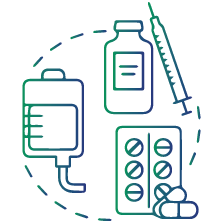
Lactate Dehydrogenase (LDH), Serum
What is Lactate Dehydrogenase (LDH) Blood Test
Lactate dehydrogenase (LDH) blood test is used to measure the body's lactate dehydrogenase (LDH) levels. LDH is an enzyme present in skeletal muscles, kidneys, brain, lungs, and red blood cells. Rising levels of LDH may mean that your tissues are damaged or you have a disease condition.
Doctors use this test to assess certain cancer types. LDH levels are generally measured using a blood sample, but it can also be examined using other bodily fluids such as those taken from the abdomen, chest, or the central nervous system.
Thus, getting your LDH test done is recommended to diagnose tissue damage or disease.
Who should get tested?
This test evaluates the serum levels of LDH, which could be high due to:

Blood flow deficiency

Stroke

Certain cancers

Heart attack

Hemolytic anemia

Liver disease (hepatitis)

Muscle injury

Muscular dystrophy

Pancreatitis

Tissue death (necrosis)

Consuming alcohol or certain drugs

Sepsis
What is serum lactate dehydrogenase test used for?
LDH test is used for diagnosing and monitoring several medical conditions such as:

To evaluate if you have tissue damage

To monitor conditions like anemia, organ disease, and certain infections that can lead to tissue damage

To evaluate the severity of specific cancer types

To monitor chemotherapy for cancer and to see if treatment is working
Preparation for the test
No special preparation is required for serum lactate dehydrogenase test.
Interpretation of results
The units of measurement for the results are Units per litre (U/L)
|
Parameters |
Normal range for total LDH |
|
Newborn |
160 to 450 units/L |
|
Child |
60 to 170 units/L |
|
Adult |
140 to 280 units/L |
Normal value ranges may slightly differ among different laboratories and some labs use different measurements.
Deviation from normal levels indicates the following:
- Megaloblastic anemia, untreated pernicious anemia, Hodgkin’s disease, abdominal and lung cancers, severe shock, and hypoxia all show marked elevations in lactate dehydrogenase (LDH) levels.
- Leukemia, progressive muscular dystrophy (especially in the early and middle stages of the disease), hemolytic anemia, infectious mononucleosis, liver disease, and kidney disease are among the other conditions that cause moderate to slight increase in LDH levels.
- About one-third of kidney disease patients, particularly those with tubular necrosis or pyelonephritis, have elevated levels of the LDH enzyme. However, there is little correlation between the LDH enzyme elevations and proteinuria or other kidney disease parameters.
- Sometimes, the only indicator of the presence of a hidden pulmonary embolus is a raised LDH level.
- Although higher levels of LDH are seen in liver diseases, they are not as noticeable as higher levels of aspartate aminotransferase (AST) and alanine aminotransferase (ALT).
FAQs
How is the sample collected during a serum lactate dehydrogenase test?
A blood sample is collected from a vein in your arm using a small needle. This procedure typically takes no longer than five minutes.
What is the turnaround time (TAT) for the results of serum lactate dehydrogenase test?
You will usually get the reports within 18 hours after the collection of the blood sample, although it could take longer at times.
What are the risks involved in serum lactate dehydrogenase test?
This test involves negligible risk. There might be slight pain or tenderness around the site where the needle was inserted. Rarely, the site can become infected.
Can serum lactate dehydrogenase test give false-positive results?
False-positive test result may be caused due to several factors such as, due to strenuous exercise, hemolysis of the blood sample due to improper storage and handling, increased platelet count, etc.
What other tests may be prescribed in case of abnormal serum lactate dehydrogenase test result?
If the serum lactate dehydrogenase test result is abnormal, your doctor may also order the following tests: lactate dehydrogenase isoenzyme test, alanine aminotransferase (ALT), aspartate aminotransferase (AST), alkaline phosphatase (ASP) and complete blood count (CBC), to conclusively diagnose tissue damage or disease conditions.

